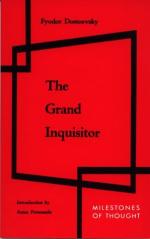|
This section contains 5,146 words (approx. 13 pages at 400 words per page) |

|
In the following essay, Pachmuss discusses Dostoevsky's concept of the dual heavenly and earthly nature of humankind as it is reflected in the Grand Inquisitor's three reproaches against Christ.
In Seeking To Reveal the tragedy of man as a dual being, Dostoevsky portrays the abnormal states of the psyche, all phenomena of which he considers manifestations of higher metaphysical realities. And an understanding of Dostoevsky's metaphysics of evil is necessary for one to discern the primal tragedy, which comes to the fore in his more mature works, particularly The Brothers Karamazov, where evil is expressed both in metaphysical and psychological terms. "The Legend of the Grand Inquisitor," an expression of Ivan Karamazov's rebellion against God, stands in close connection with Dostoevsky's earlier writings, for it discloses more of the concept of duality which underlies the works previously examined. It reflects Dostoevsky's lifelong study of man as a...
|
This section contains 5,146 words (approx. 13 pages at 400 words per page) |

|




